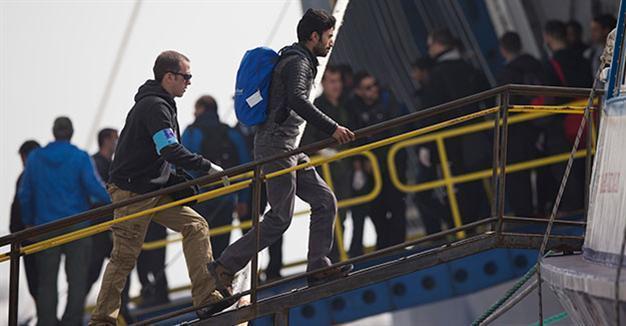UN Committee on Migrant Workers to review Turkey
GENEVA/ANKARA

An officer from the European Union?s border protection agency, Frontex, leads a migrant to board a ferry in the port of Mytilini, Lesbos island, Greece, on Friday, April 8, 2016 - AP photo
Turkey’s record on protecting the rights of migrant workers is due to be reviewed for the first time by the U.N. Committee on the Rights of Migrant Workers (CMW) next week in Geneva.During meetings between the CMW and a delegation from the Turkish government scheduled for April 14-15, a wide range of issues are likely to be discussed such as the clarification of status and rights granted to refugees who fled their countries outside the Council of Europe, particularly Syria; ensuring the human rights of migrant workers crossing borders; implementation of the March 18 EU-Turkey agreement, including expulsion of migrant workers from Turkey prior to and following the agreement; conditions of detention for migrant workers, including alternatives to detention, especially for children and families; protection of migrant children from forced labor and exploitation; access to justice, education and healthcare for migrant workers and their families; extent of people smuggling and trafficking; specific laws to criminalize human trafficking, procedures to protect victims; measures to facilitate the right of Turkish workers living abroad to vote; consular services for Turkish migrant workers and their families abroad and efforts to facilitate their safe and sustainable return to Turkey.
Turkey is one of the 48 parties to the International Convention on the Protection of the Rights of All Migrant Workers and Members of their Families, and so is required to be reviewed regularly by the committee.
On Jan. 15, a cabinet decision to grant work permits to refugees who have fled to Turkey to escape conflicts in their homeland went into force. It did not specify nationality, but the measure chiefly applies to the around 3 million Syrians who have fled the almost five-year conflict in their home country for the relative safety of Turkey, as well as some 300,000 Iraqis.
Refugees in Turkey are not allowed to work or be employed in the country without a valid work permit, according to a government decree.
In early January, Turkish police seized over 1,200 unsafe life jackets destined for use by migrants trying to reach Greece by sea, in a raid on an underground workshop in the center of the Aegean city of İzmir that used Syrian underage labor.
In late January, Britain’s Independent claimed H&M and Next admitted to identifying child labor in supplier factories in Turkey. After an effort to gauge the scale of the problem, the Business and Human Rights Resource Centre (BHRRC) asked 28 major brands last month about their Turkish suppliers and their strategies for combating the exploitation of Syrian children and adults.
At the time, the head of the Istanbul Readymade Clothing and Confection Exporters’ Association (İHKİB) denied the reports.
“It is impossible legally in Turkey to hire child labor. Besides, H&M and Next will never accept such production [practices],” İHKİB’s Hikmet Tanrıverdi said in a statement on Feb. 1.
















